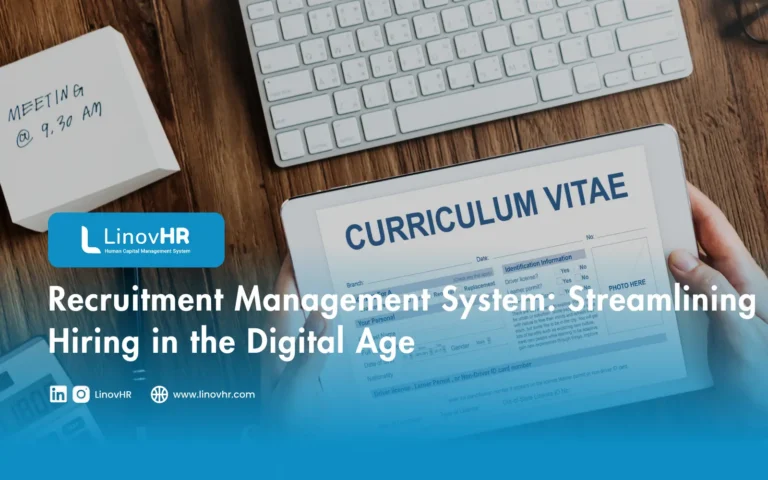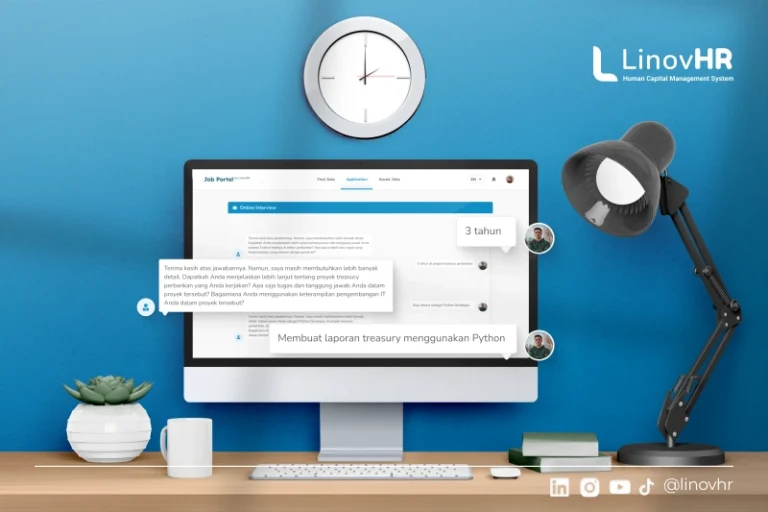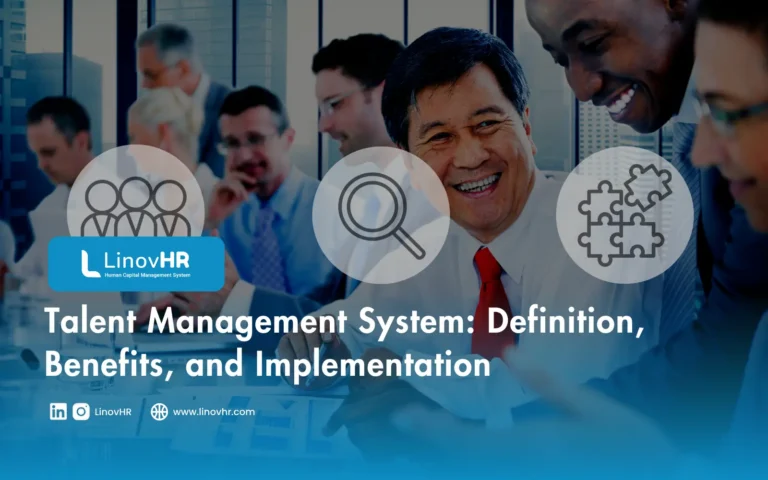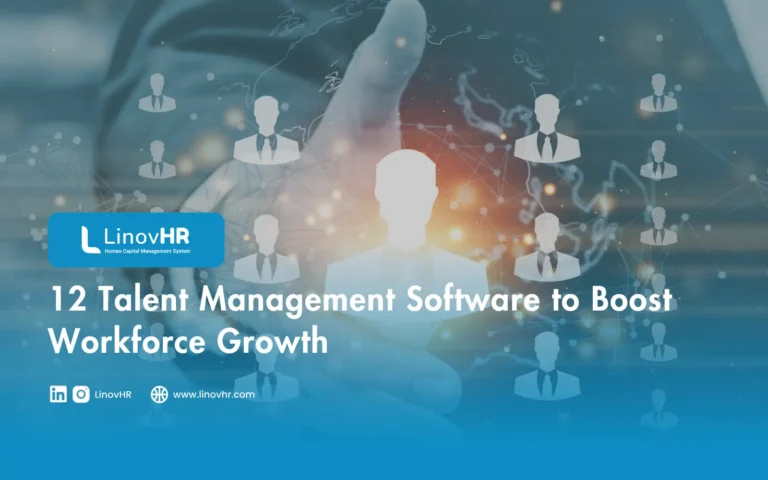In today’s competitive job market, companies face increasing pressure to attract, evaluate, and hire top talent quickly. Manual recruitment methods such as spreadsheets, endless email chains, and scattered candidate data can no longer keep up with modern hiring demands.
That’s where a Recruitment Management System or RMS comes in. Designed to streamline every step of the hiring process, RMS software empowers HR teams and business owners to make smarter, faster, and more data-driven hiring decisions.
In this article you will know about recruitment management systems, key features of recruitment management systems, types of companies that have to use recruitment management systems, and also how to choose the right recruitment management system for your company.
What Is a Recruitment Management System?
A recruitment management system is an integrated software platform that automates and optimizes the end-to-end hiring process, from posting job openings and screening applicants to onboarding successful candidates.
It acts as a central hub where all recruitment-related activities can be managed efficiently, ensuring consistency and transparency across all stages of hiring.
Unlike traditional methods that rely on manual effort, a recruitment management system software leverages automation and analytics to help companies attract and retain top talent more effectively.
It reduces administrative burdens for HR teams, minimizes human error, and enhances the overall candidate experience. Through its data-driven capabilities, RMS enables better hiring outcomes while ensuring that recruitment aligns with business goals.
Key Features of Recruitment Management System
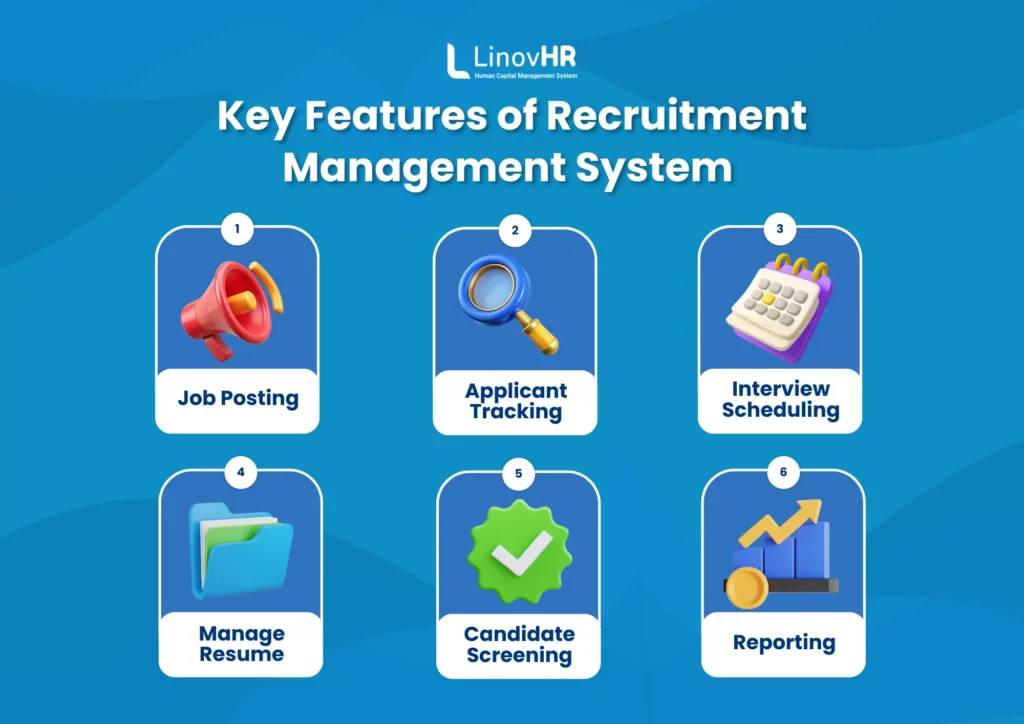
It’s important to understand the key features that define an effective solution. These functionalities determine how efficiently your company can manage and optimize the hiring process.
1. Job Posting
The recruitment management system enables HR to publish job openings across multiple channels from company career pages to job boards and social media all from a single interface.
This centralised posting streamlines reach and consistency, ensuring your employer brand appears clearly and uniformly across platforms.
Additionally, some RMS platforms provide pre-built templates and workflow automation for job approval and budget tracking, reducing time spent on manual coordination and increasing transparency in how roles are advertised.
2. Applicant Tracking
Within a recruitment management system, applicant tracking provides a visual pipeline of candidates moving through each stage of the hiring process from application to offer.
This traceable workflow ensures that no applicant falls through the cracks and allows HR to identify bottlenecks or delays efficiently.
Furthermore, by logging all candidate interactions and status updates, the RMS software creates a reliable audit trail and supports data-driven insights into sourcing effectiveness, recruiter performance, and time-to-hire metrics.
3. Interview Scheduling
Recruitment management system specifically designed for hiring, interview scheduling tools embedded in an RMS automate the coordination between candidates, recruiters, and hiring managers.
Calendar integrations and automatic notifications reduce the back-and-forth often associated with arranging interviews, creating a smoother experience for all parties.
In addition, this feature often allows the recording of interviewer feedback directly into the system, enabling a seamless transition from evaluation to decision-making without manual data entry or email follow-ups.
4. Manage Resume
A recruitment management system software typically includes a dedicated repository where resumes and application documents are stored, tracked, and searchable.
This enables recruiters to access candidate profiles, sort based on criteria, and build talent pools for future hiring needs.
By centralising resume management, HR departments reduce the risk of lost files and duplication, improve searchability through tagging and filtering, and gain the ability to re-engage past applicants for new roles quickly and efficiently.
5. Candidate Screening
Automated candidate screening is a key capability of modern RMS, using algorithms or AI to assess resumes, match keywords, and flag candidates that meet pre-defined criteria.
This feature significantly shortens the time spent manually reviewing applications and improves the consistency of evaluation.
Moreover, the outcome of the screening process is logged in the system, enabling HR teams to review screening trends, refine criteria, and ensure compliance with internal hiring standards or regulations thereby enhancing both speed and integrity of recruitment.
6. Reporting
One of the most strategic aspects of a recruitment management system is its reporting and analytics dashboard, which aggregates recruitment data into visual insights.
This empowers hiring teams to monitor KPIs such as cost-per-hire, source conversion rate, time-to-fill, and more providing a clear view of hiring performance.
Why Recruitment Management Systems Matter for Modern Business?
A recruitment management system helps companies respond faster to changing workforce needs by centralizing data, automating repetitive tasks, and improving collaboration between HR teams and department heads.
The result is a streamlined recruitment workflow that reduces time-to-hire and ensures the right candidate is selected for the right role. Moreover, recruitment management system software enhances the candidate experience, which has become one of the most important factors in employer branding today.
With features like automated interview scheduling, personalized communication, and self-service portals, RMS helps businesses present a professional and engaging image to potential employees. It bridges the gap between technology and human interaction in modern recruitment.
Also read: AI in Recruitment: How Technology is Transforming Hiring in 2025
Types of Companies That Benefit Most from Recruitment Management System
While any company can benefit from a recruitment management system, certain industries and company sizes find it particularly essential for managing complex recruitment needs efficiently.
1. Small and Medium Sized Businesses
Small and medium businesses often lack large HR departments but still need efficient hiring processes. Recruitment management systems help these companies automate administrative tasks and maintain professionalism during recruitment, even with limited staff and resources.
2. Large Enterprises
Enterprises with multiple departments and high hiring volumes benefit from the centralized data and standardization provided by recruitment management system software, which ensures consistency across global teams.
3. Recruitment Agencies
Agencies managing multiple clients can use recruitment management systems to streamline candidate sourcing, tracking, and reporting for improving service quality and client satisfaction.
4. Remote or Hybrid Companies
Businesses hiring remotely can leverage cloud-based recruitment management system tools to collaborate seamlessly with teams and candidates worldwide.
5. Highly Regulated Industries
These industries depend on recruitment management systems to maintain compliance with strict hiring regulations and ensure proper documentation.
How to Choose the Right Recruitment Management System
Selecting the right recruitment management system requires careful consideration of your company size, budget, and hiring goals. Below are the most important aspects to evaluate when choosing an recruitment management system or RMS.
1. Evaluate Scalability and Customization
Every business has unique recruitment needs. Choose an RMS that can grow with your company and adapt to changing hiring demands. Scalable systems support additional users, integrations, and workflows as your company expands.
2. Prioritize User Experience
The ideal recruitment management system software should be intuitive for both recruiters and candidates. A user-friendly interface encourages adoption among HR teams and minimizes training costs.
3. Integration and Vendor Support
Ensure recruitment management systems are integrated seamlessly with your existing HR software ecosystem. Reliable vendor support and continuous product updates are essential for long-term success and smooth implementation.
Also read: 15 Best Recruitment Automation Software for Smarter Hiring in 2025
Benefits of Using a Recruitment Management System
Adopting a recruitment management system can significantly improve both efficiency and hiring quality. Below are some of the top advantages companies can expect.
1. Increase Hiring Efficiency
Recruitment management system automates repetitive tasks such as resume sorting, interview scheduling, and communication follow-ups. This reduces manual workload and shortens the overall hiring cycle.
2. Enhanced Candidate Experience
A recruitment management system enhances the candidate experience by ensuring timely communication, transparent updates, and an intuitive application process. This leads to stronger employer branding and higher acceptance rates.
3. Better Data Driven Decisions
By leveraging analytics within the recruitment management system software, HR teams can track performance metrics, understand bottlenecks, and continuously improve recruitment strategies.
Develop Your Hiring Strategy with LinovHR
In today’s digital era, companies struggling with inefficient hiring workflows need a smarter solution. Many companies face challenges such as managing large volumes of applications, poor coordination between departments, and limited visibility into recruitment data.
LinovHR’s Recruitment Management System offers an all-in-one solution designed to streamline hiring from start to finish. The software automates critical processes, enhances collaboration, and provides insightful analytics to support data-driven decisions.
Request a free demo of LinovHR’s recruitment management system and discover how it can transform your recruitment process into a seamless, strategic advantage.


